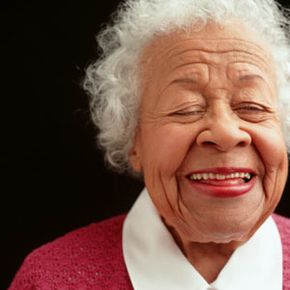Aging can also play havoc on your five senses. Read on to learn how sight, hearing, and even taste can deteriorate with age.
Eyesight and Aging
Are you holding your newspaper at arm's length? Squinting at documents to see the fine print? Do you need more light to see clearly? Each passing decade brings changes that weaken eyesight, including the slow loss of ability to focus on close objects or small print.
Presbyopia, the most common reason why you and your peers need reading glasses, is characterized by decreasing ability to focus on nearby objects. This condition typically shows up around age 40 but often develops for decades before that.
Some of the age-related eye changes are obvious, while others go undetected until vision is limited in some way. For example, the tissues surrounding eyes lose their tone, and fat is lost, too, which results in droopy upper eyelids and the turning outward or inward of the lower lid.
On the other hand, cataracts, which cloud your vision by keeping the light from getting through the clear lens of the eye, are barely detectable because they form at a snail's pace, are painless, and don't result in any redness or tearing in the eye. Over the years, the iris, the colored part of your eyeball, loses flexibility.
Your pupils -- the black holes in the iris that respond to light -- get smaller, and the lenses start to accumulate yellow substances, possibly as a result of exposure to sunlight. These changes predispose you to glaucoma, the product of excessive pressure inside your eyeball, which can lead to vision loss and blindness. No one knows the cause of glaucoma, but it is more prevalent in older people, African-Americans, and in those with a family history of the disease.
Glaucoma is basically symptom-free, often until it is too late. Once glaucoma has damaged the optic nerve, which transmits visual information from the eye to the brain, you're past the point of treatment. That's why The Glaucoma Foundation recommends testing for glaucoma every four years until age 45 and every two years after that. Get tested every two years regardless of age if:
- you're of African-American descent
- glaucoma runs in your family
- you are nearsighted
- you have high blood pressure
- you've been using cortisone long-term
Decreased blood flow to the retina, the paper-thin tissue lining the back of your eyeball, can lead to macular degeneration. Macular degeneration destroys sharp, central vision.Hearing and Aging
Find yourself saying "what?" more often? Maybe you don't like crowds as much since you can't detect the nuances of conversations that well. Hearing loss is one of the most common complaints of getting older, especially for men, who are more prone to hearing loss at any age.
Aging produces a progressive hearing loss at all frequencies, known as presbycusis. After age 55, your ability to detect changes in the pitch of sounds drops off dramatically, which can make your speech less understandable to others. In addition, the walls of your ear canal thin out, and earwax production falters.
Your eardrum thickens. You may even get arthritis in the joints that connect the bones found in the inner ear. Yet, no one knows for sure if these changes in hearing can be put down to the aging process. But it's certain that the loss of hair cells is what diminishes hearing the most.
Hair cells are part of the inner ear that help transmit impulses to a nerve that transfers them to your brain for processing. Nerve damage, injury, exposure to loud noise, and certain medications can cause hair cell loss.
Aging and Taste
You can thank your nose for your sense of taste, despite the thousands of taste buds populating your tongue: They can only detect a mere four out of thousands of possible flavors in foods.
The tongue recognizes only sweet, salty, bitter, and sour tastes. That's why enjoying food is limited without a healthy sense of smell. When you chew food and drink beverages, their aromas are released in your mouth.
Saliva dissolves flavor-producing substances in food and drink that make contact with your tongue's taste buds. More importantly, dissolved flavor compounds waft up the back of your throat, making their way to receptor cells in your nose. From there, nerves transmit flavor messages to the brain, allowing you to perceive and enjoy them.
If you're having trouble savoring the flavor of food, blame it on a lessened sense of smell. Time dulls your sense of smell, but not usually until you reach age 60, and then it varies from person to person. About half of adults over the age of 65 suffer from some diminished sense of smell. On the other hand, your sense of taste for sweet, salty, bitter, and sour foods may be remarkably intact until you're well into your seventies.
A zinc deficiency can also cause a decreased sense of taste. Zinc supplementation can help restore it if you do have a deficiency. Infections threaten sense of smell and, as a result, your ability to enjoy food. Some of the damage from the flu, colds, or hepatitis can be permanent. More often than not, acute illnesses, including sinus infections and seasonal allergies, block aromas from the receptor cells that relay flavor information to the brain.
As a result, you don't have as much capacity to savor the flavors of food. The pills you take every day to control medical conditions such as high blood pressure and arthritis can affect sense of taste, mainly by affecting the areas of the brain where you perceive flavors. Chemotherapy drugs and head and neck radiation also threaten flavor perception, sometimes permanently.
To learn more about senior health, see:
ABOUT THE AUTHORS
Elizabeth Ward, M.S., R.D., is a nutrition consultant and writer. She is the author or coauthor of five books, including Super Nutrition After 50 and The Complete Idiot's Guide to Feeding Your Baby and Toddler. Ward is the nutrition editor of Muscle & Fitness Hers, a contributing editor for Environmental Nutrition, and a contributing writer for WebMD.com.
Jeffrey Blumberg, Ph.D., F.A.C.N., C.N.S. is a professor of nutrition science and policy and is the director of the Antioxidants Research Laboratory in the Jean Mayer USDA Human Nutrition Research Center on Aging at Tufts University. In addition to publishing more than 180 research articles in peer-reviewed scientific journals, he has served on the Surgeon General's Workshop on Health Promotion and Aging, the Sports Medicine Committee of the U.S. Olympic Committee, the Board of the American Aging Association, the WHO/FAO Consultation on Preparation and Use of Food-Based Dietary Guidelines, the Food Advisory Committee of the FDA, and the WHO Expert Consultation on the Development of Nutrition Guidelines for the Elderly. He serves on the editorial board of several scientific journals, including the Journal of the American College of Nutrition, the Journal of Nutrition for the Elderly, the Journal of Medicinal Food, and Antioxidants & Redox Signaling.


